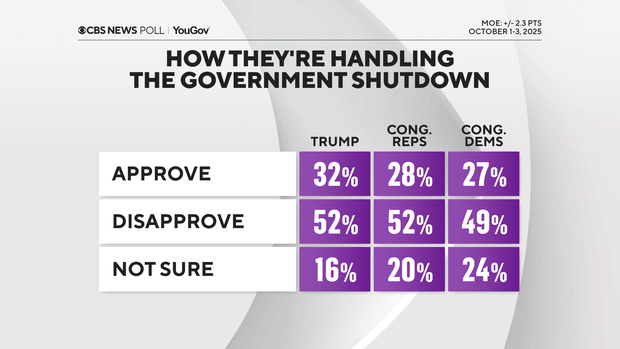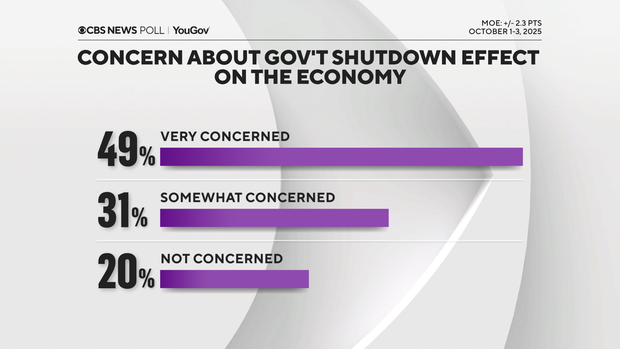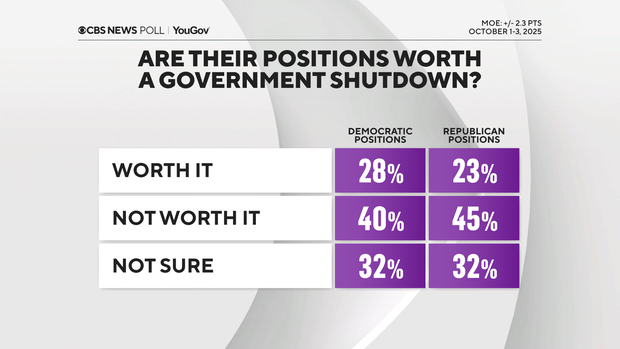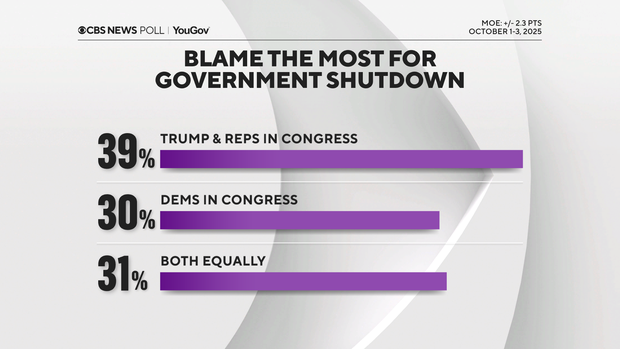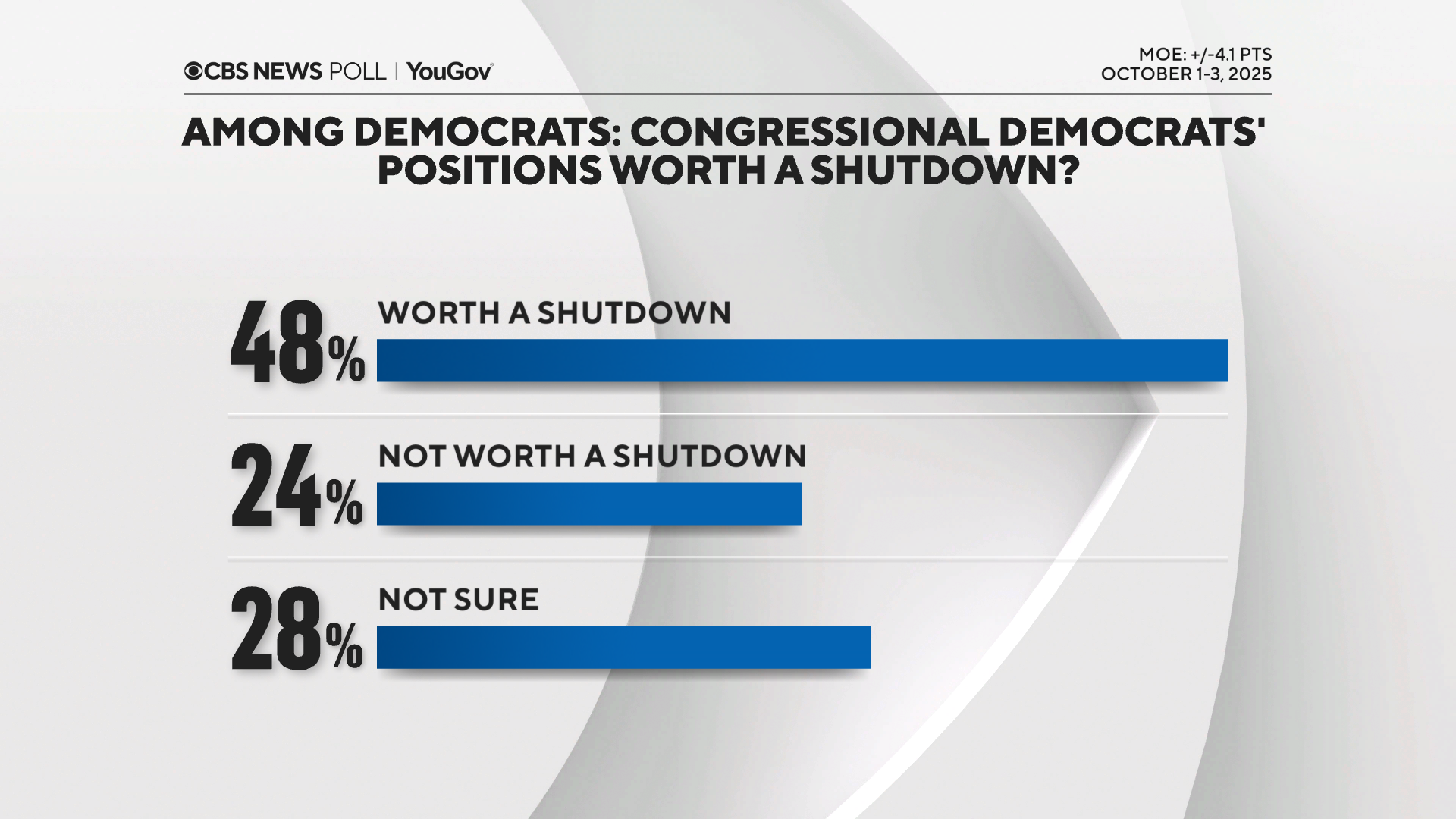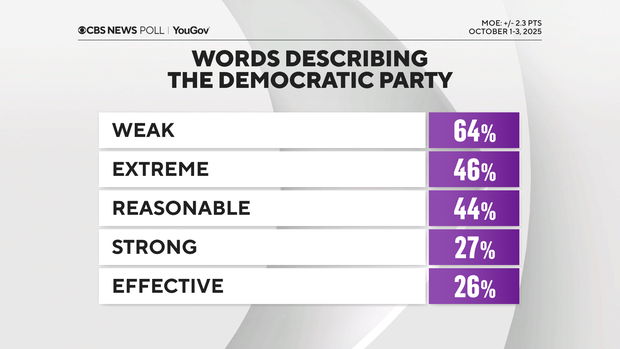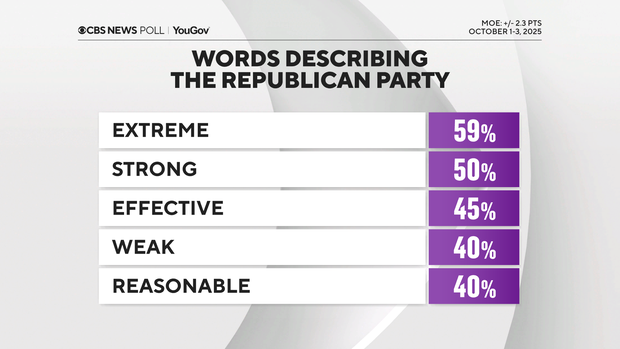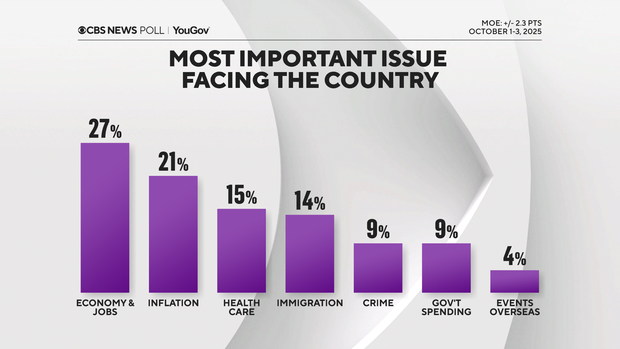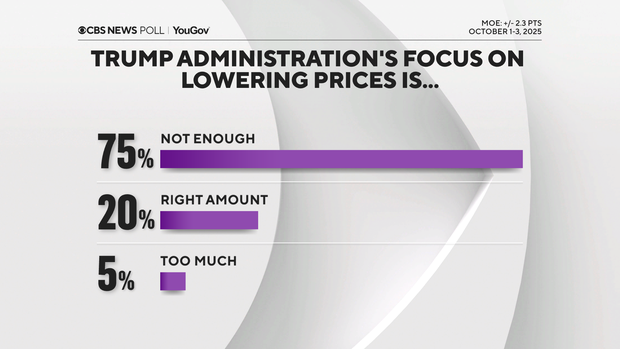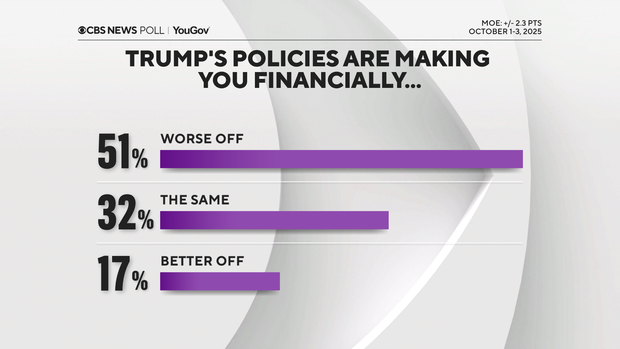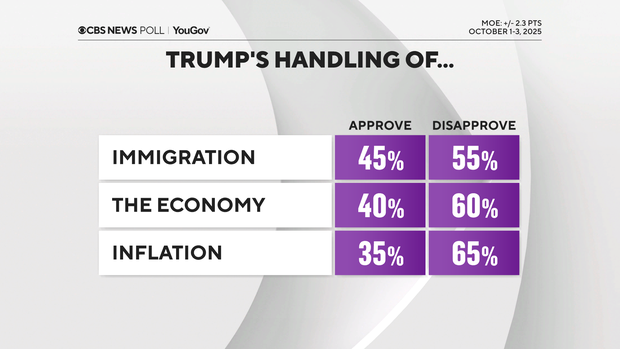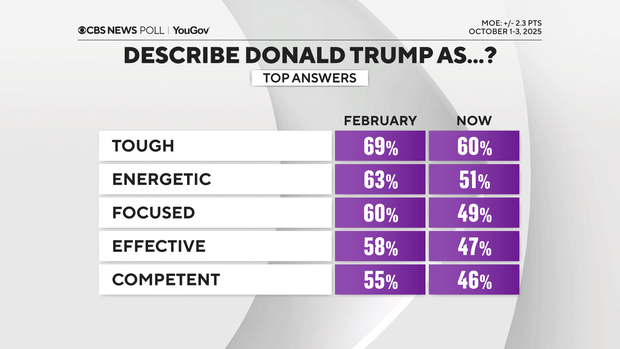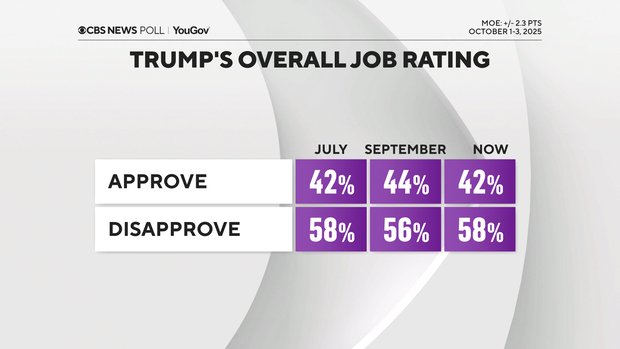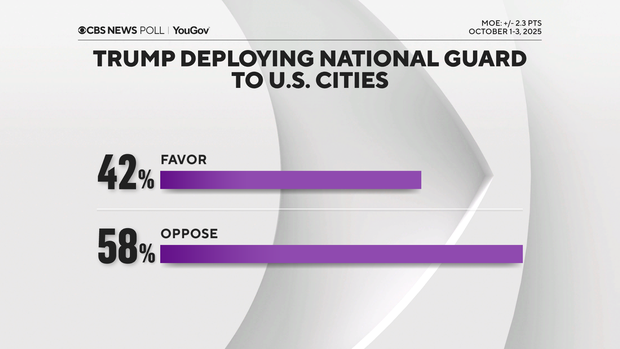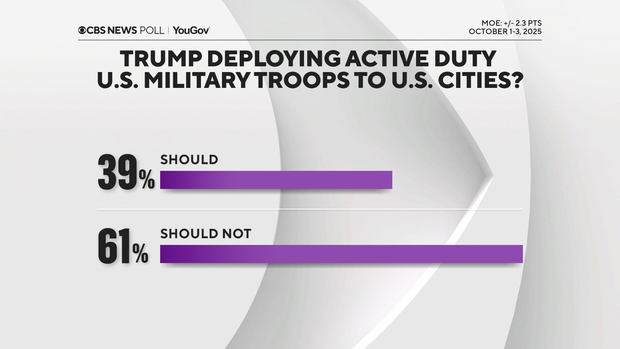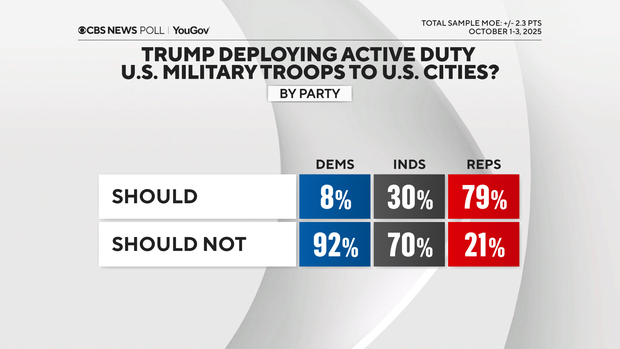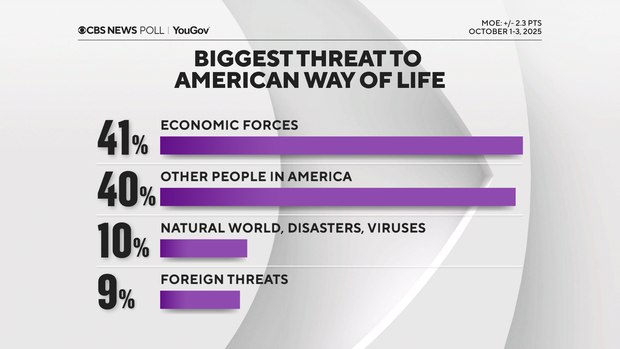CBS News poll finds few feel shutdown is worth it; low marks for Republicans, Democrats, Trump's handling
For many Americans, across party lines, concern over the government shutdown means concern about its potential impact on the economy, among other things.
Therefore, many don't think either party's position is worth having a shutdown over.
Given that, no one is looking especially good politically at the moment. President Trump, congressional Democrats, and Republicans are all net negative on their handling of the shutdown thus far.
Neither party is on very solid footing. The top descriptor Americans pick for the Democratic Party overall is "weak;" the party trails the GOP on being described as "effective" and "strong," and their favorables trail the GOP's. The top descriptor for Republicans, though, is "extreme."
All of it looks to the public like another distraction from larger matters of concern. A sizable majority of the country says the Trump administration isn't focused enough on lowering prices, and is focused too much on tariffs, as they have been for months. Reflecting some of that, many still describe the president himself as "energetic," but fewer describe him now as "focused" than did at the start of his term.
Relatively few Americans say the Democrats' or Republicans' positions are worth a shutdown. As it is still fairly recent, many aren't sure yet.
For the Democrats, only half their rank and file think their party's positions are worth a shutdown, and even fewer Republicans say that of the GOP's positions. That said, they don't blame their respective parties for the situation, either.
There's plenty of that blame to go around. Republicans and the president get relatively more than congressional Democrats, but taken together with Americans who blame both equally, a majority of the country holds all of them responsible.
When asked what the shutdown debate is mainly about, health care is the top response from a list of issues, and those following the matter more closely pick that more often. That may speak to the parties' respective arguments getting at least to their bases.
The percentage very concerned about the impact on the economy is higher than for other items.
People also express concern, to a lesser degree, about the effects of the shutdown on federal employees. Also, the military, transportation and air travel, and Social Security and Medicare, which, even if they are not directly part of the negotiations, likely show that people tend to associate these programs with the government, generally.
Still, overall views and descriptors of the parties aren't positive ones. Each has underwater favorability ratings overall, with the Republicans getting slightly better ratings than the Democrats.
From a list of descriptors of the parties, it's a case of weak (the way most of the nation describes the Democratic Party) versus extreme (the most often-picked label for the GOP).
The Republican Party greatly outpaces the Democrats on being called "effective" and "strong."
Over four in 10 rank-and-file Democrats describe their own party as weak.
The economy and the presidentAgainst the backdrop of the shutdown, and helping explain why so many are concerned about its economic impact, inflation and the economy continue to be seen as the nation's top issues. And as has been the case for a while, a large majority says the Trump administration isn't focused enough on lowering prices. And most continue to say it is focused too much on tariffs.
And most say Trump's policies are costing jobs in the U.S., rather than creating jobs.
That's combined with Americans' view that Trump's policies aren't making them better off and are still making prices go up. On balance, the president's handling of inflation, specifically, has ticked down again.
Fewer Americans now describe the president as "focused" than did at the start of his second term. His top descriptors remain "tough" and "energetic," but the percentage who call him "effective" is also down compared to February.
More broadly — and not specifically related to the shutdown, but perhaps pertinent given that situation — Americans still say it's Congress, not the president, who should have the most authority over federal spending. That's a view held by majorities of Democrats, independents, and Republicans.
Donald Trump's overall approval rating, at 42%, is now back down to what it was in July, after hitting 44% last month. He remains bolstered by support from his Republican base, and still gets better marks on his deportation program and immigration than on inflation and the economy overall.
At 43%, the president's approval rating on handling the conflict between Israel and Hamas is similar to what it was this summer, and higher than his approval ratings on economic issues. (This polling was conducted before reports of a possible ceasefire deal.)
Troops and U.S. citiesThe idea of troops going to U.S. cities remains divisive. It's backed staunchly by the president's Republican base, especially those who identify as MAGA, but finds far less backing beyond it.
Whether it's the National Guard specifically or active-duty military troops going to cities, views are similar. Much of it, beyond the partisan breaks, is tied to where one sees threats to the U.S. originating.
Those who support troops in cities tend to see threats from inside the country, subscribing to some of the arguments made by the administration, that threats are coming from domestic enemies.
But for the majority of Americans who see dangers more from economic forces, or who feel the U.S. military's overall focus ought to be outside the U.S., it is much less so.
For decades now, a majority of Americans have backed having women who serve in the military participating in combat roles, and that continues to be the case today, at three-quarters, a view shared equally by men and women. The quarter of Americans who do not think women in the military should participate in combat roles tend to be more conservative.
This CBS News/YouGov survey was conducted with a nationally representative sample of 2,441 U.S. adults interviewed between October 1-3, 2025. The sample was weighted to be representative of adults nationwide according to gender, age, race, and education, based on the U.S. Census American Community Survey and Current Population Survey, as well as 2024 presidential vote. The margin of error is ±2.3 points.
